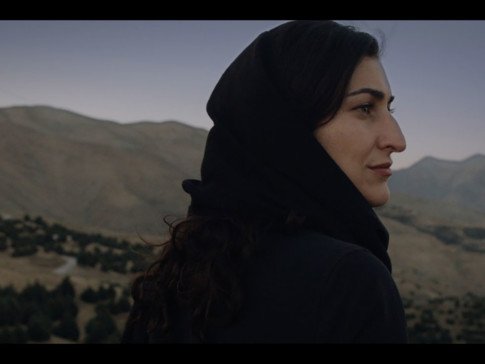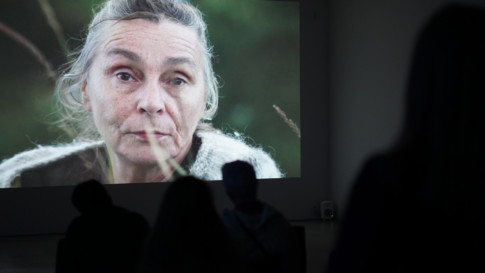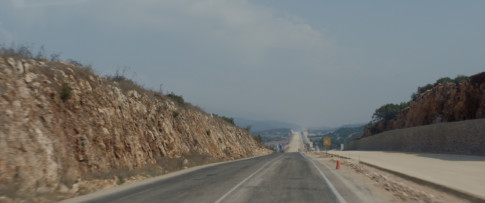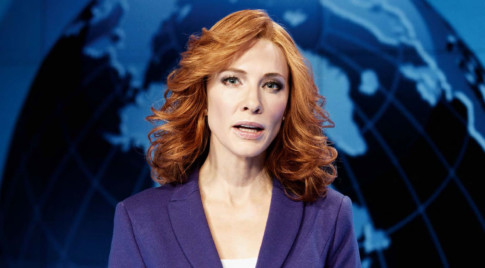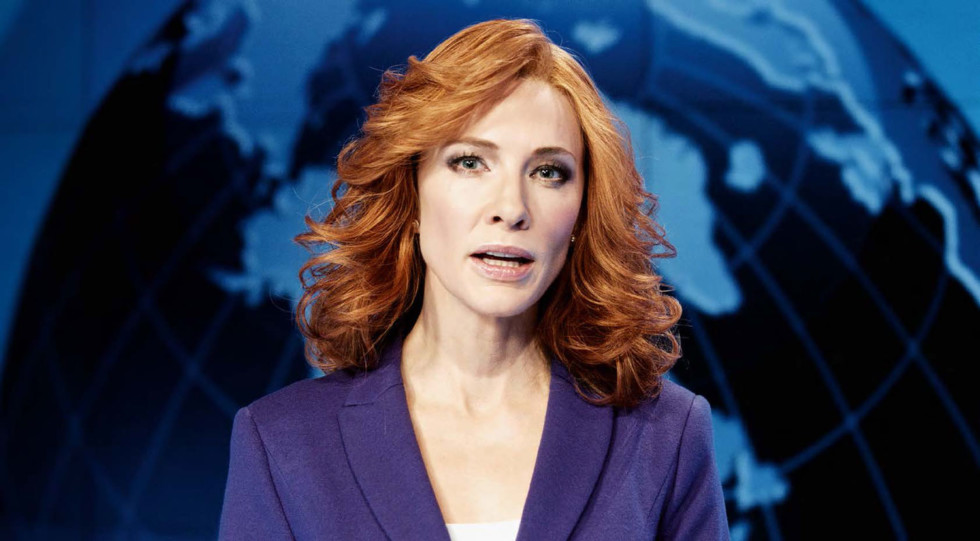
Manifesto (film still), 2015
The Film Club spring 2018
The Film Club 2018 spring programme
Manifesto (2015)
Julian Rosefeldt, Germany, 95 min.
Date: Friday 9 February, at 18.00
Grace Jones: Bloodlight and Bami (2017)
Sophie Fiennes, Ireland/United Kingdom, 115 min.
Date: Friday 2 March, at 18.00
Strophe, a Turning (2017)
Ellie Ga, 37 min.
Date: Friday 9 March, at 18.00
Hélio Oiticica (2012)
César Oiticica Filho, Brazil, 94 min.
Date: Friday 23 March, at 18.00
33 Situations (2015)
Anna Daučíková, 109 min.
Date: Friday 6 April, at 18.00
An Opera of the World (2017)
Manthia Diawara, Portugal/USA/Mali, 70 min.
Date: Friday 4 May, at 18.00
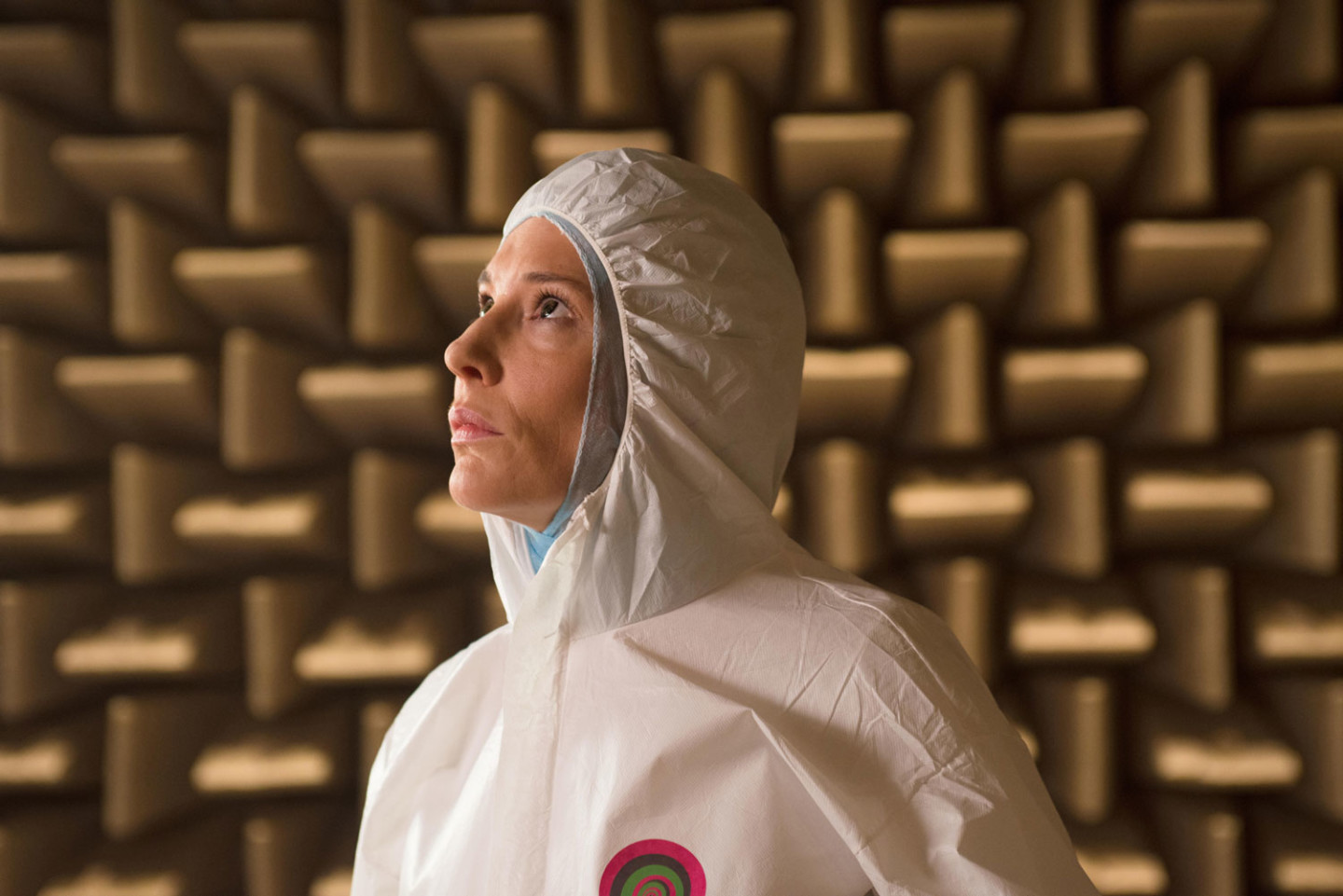
Manifesto (2015)
Julian Rosefeldt
Germany, 95 min.
Date: Friday 9 February 2018
Time: at 18
Place: the Auditorium, floor 2
Language: English, Swedish subtitles
Price: 65 SEK, 45 SEK for members in Friends of Moderna Museet
Tickets: Buy ticket
The film bar outside the Auditorium is open at 17.30–18.
At 17–17.30 before the film screening on 9 February, the Curator Matilda Olof-Ors will give an introductory talk on the exhibition Lygia Pape: Ttéia 1,C. Free admission .
The Moderna Bar will be open after the film screening. Student discount in the bar.
In collaboration with the Stockholm Feminist Film Festival.
On Manifesto (2015)
Julian Rosefeldt
Germany, 95 min.
Julian Rosefeldt’s film Manifesto (2015) pays homage to the tradition of artistic manifestos, ultimately questioning the role of the artist in society today. Manifesto draws on the writings of futurists, dadaists, fluxus artists, suprematists, situationists, Dogma 95 and other groups, and the musings of individual artists, architects, dancers and filmmakers.
Performing these manifestos as a contemporary call to action, while inhabiting thirteen different personas, Academy Award winner Cate Blanchett imbues new dramatic life into both famous and lesser-known words in unexpected contexts.
Julian Rosefeldt
Julian Rosefeldt, born in Munich, Germany in 1965, is a Berlin-based artist and filmmaker. He is internationally renowned for his visually opulent and meticulously choreographed moving image artworks, mostly presented as multi-screen installations.
Inspired equally by the histories of film, art and popular culture, Rosefeldt uses familiar cinematic tropes to carry viewers into surreal, theatrical realms, where the inhabitants are absorbed by the rituals of everyday life, employing humor and satire to seduce audiences into familiar worlds made strange. Rosefeldt currently holds a professorship of Digital and Time-based Media at the Academy of Fine Arts in Munich since 2011.
Rosefeldt has had numerous international, solo exhibitions at museums such as the Park Avenue Armory Hall, New York (2016 / 2017), the Hamburger Bahnhof – Museum für Gegenwart in Berlin (2016), the ACMI – Australian Centre for the Moving Image (2015) and many more. Past group shows include Moving Time: Video Art at 50: 1965 – 2015 at CAFA Art Museum, Beijing (2016), Wolfsburg Unlimited at the Kunstmuseum in Wolfsburg (2016), Zeitgeist: The Art of New Berlin at the CCBB in Rio de Janeiro (2016) and Conflict, Time, Photography at the Tate Modern in London (2014).
His work is held in collections including the Neue Nationalgalerie, Berlin, Saatchi Collection, London and the Museum of Modern Art, New York, among others.
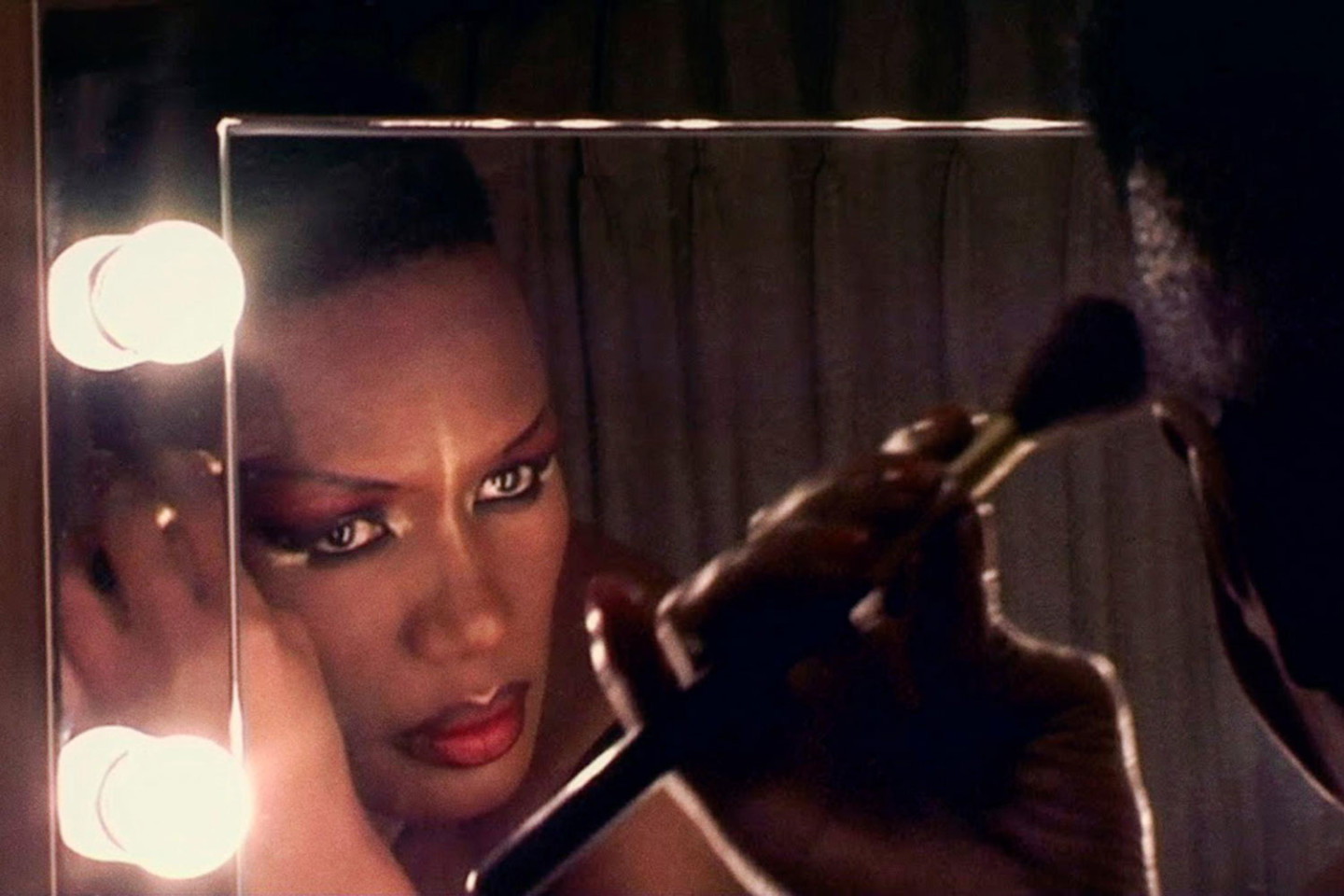
Film screening and party
Grace Jones: Bloodlight and Bami (2017)
Sophie Fiennes
Ireland/United Kingdom, 115 min.
Date: Friday 2 March,
Time: at 18.00
Place: the Auditorium, floor 2
Language: English and French, Swedish subtitles
Price: 130 SEK
Tickets: CinemAfrica
The film bar outside the Auditorium is open at 17.30–18.
After the screening, there will be a talk with the director, Sophie Fiennes, followed by a party in tribute to Grace Jones, featuring ImOnARoof, at 20–00 in the Restaurant and Bar.
Watch trailer: Grace Jones: Bloodlight and Bami
In collaboration with CinemAfrica
On Grace Jones: Bloodlight and Bami (2017)
Sophie Fiennes
Ireland/United Kingdom, 115 min.
Grace Jones is a style icon and a living legend on the club scene and in popular culture. Sophie Fiennes’ intimate portrayal follows the star in the process of recording a new album, with material based on personal experiences.
Grace Jones: Bloodlight and Bami challenges the documentary tradition that has generated countless one-dimensional mythologising portraits of women artists. Fiennes cuts from glamorous stage performances in New York and Paris, to informal chats with friends and family on Jamaica, and brings the audience closer to the human being Grace Jones.
Sophie Fiennes
Sophie Fiennes is a film director whose feature documentaries for theatrical exhibition include her collaborations with the Slovenian philosopher Slavoj Žižek, The Pervert’s Guide to Cinema, (2006) and The Pervert’s Guide to Ideology, (2012), her portrait of German artist Anselm Kiefer, Over Your Cities Grass Will Grow, (2010) and her most recent film Grace Jones; Bloodlight and Bami, (2017), an observational odyssey into the world of the iconic singer and performer. This project came about following Fiennes first feature documentary Hoover Street Revival, (2001), about a Pentecostal church community in Los Angeles, and the sermons of its preacher, Bishop Noel Jones, brother of Grace Jones.
Fiennes work for television includes her first short Lars from 1–10, about the Danish film director Lars Von Trier and his ‘Dogme rules’ film manifesto and arts documentaries, The Late Michael Clark, (2000), Because I Sing, (2001) VSPRS Show and Tell, (2005) and Liu Xiaodong Half Street, (2013). She also made a 5 minutes fictional short First Row Orchestra, for the Arte’s Hopper Vu Par, (2012).
Fiennes’ films have received international distribution and screened in festivals from Cannes official selection to Toronto and Sundance. She was awarded a Nesta fellowship in 2001, to develop her innovative approach to film, and the Arte France Cinema Award in 2008, at Rotterdam’s CineMart.
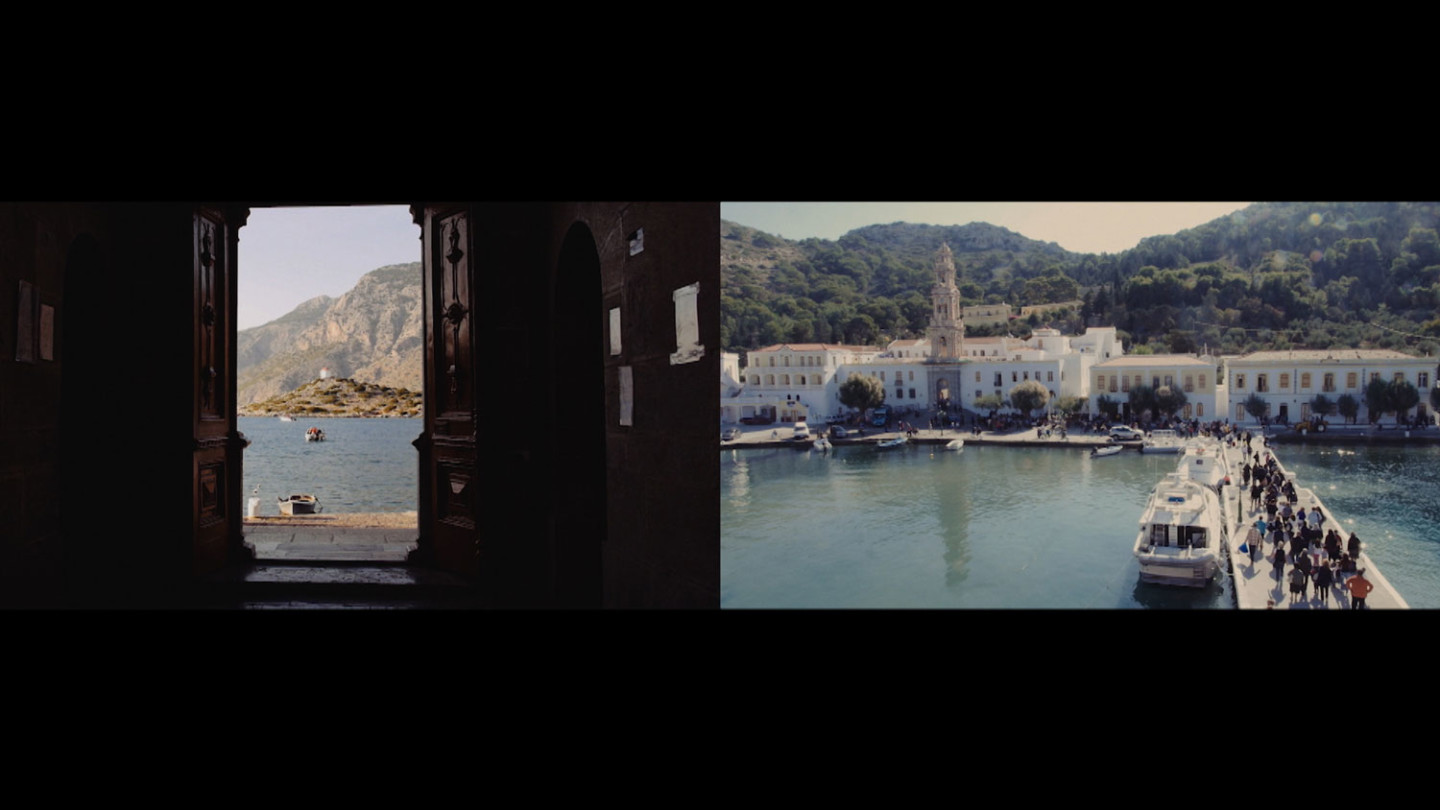
Strophe, a Turning (2017)
Ellie Ga
37 min.
Date: Friday 9 March 2018
Time: at 18.00
Place: the Cinema, floor 2
Language: English
Price: 65 SEK, 45 SEK for members in Friends of Moderna Museet
Tickets: Buy ticket
The screening is followed by a talk with artist Ellie Ga.
The Moderna Bar will be open after the film screening. Student discount in the bar.
In collaboration with the Royal Institute of Art.
On Strophe, a Turning (2017)
Ellie Ga
37 min.
Strophe, a Turning (2017) opens with the artist quoting the Russian poet Osip Mandelstam who compares launching a message in a bottle to the act of writing a poem to an unknown reader. Taking cues from both a bottle at sea and the beachcomber who eventually happens upon it, Ga initially developed the work out of her interest in how drifting objects have been used to chart sea movement. But her willingness to drift and follow uncertain turns, carries her unexpectedly to the Greek island of Symi, and then to the shores of its neighbour Lesvos, during the summer of 2015.
Ga is confronted by the mutable context of these islands, and decides to join a team of volunteers aiding asylum seekers and refugees—a definitive turning point at which she is forced to wrestle not only with the poetics of accidental drift, but with urgent political and humanitarian realities with which she confronts, processes, and situates within a nuanced and complex history of endurance, faith, and indeed, chance.
Ellie Ga
Ellie Ga (American, born 1976) lives and works in Stockholm. Her work was included in Storylines, Guggenheim Museum, New York, USA (2015); L’Epais Réel, La Criée Centre for Contemporary Arts, Rennes, France (2015); ARKTIS, Louisiana Museum of Modern Art, Denmark (2013); Museum as Hub: Walking Drifting Dragging, New Museum, New York, USA (2013).
Recent one person exhibitions include Strophe, A Turning, Bureau, New York (2017); The Fortunetellers, Square Octagon Circle, Le Grand Café, France (2015); Pharos, M-Museum, Leuven, Belgium (2014). Ga has presented her performance works at the Fondation Cartier pour L’Art Contemporain, Paris (2015); The Kitchen, New York (2015 and 2011); and the Guggenheim Museum (2015). Her work is multiple public collections including FRAC Franche-Comté, Hessel Museum of Art, and the Solomon R. Guggenheim Museum. In 2016, she was a resident at IASPIS.
Ellie Ga’s Strophe, a Turning was funded by an Artistic Research and Development grant from the Swedish Research Council (Vetenskapsrådet), hosted by the Royal Institute of Art, Stockholm (Kungliga konsthögskolan).
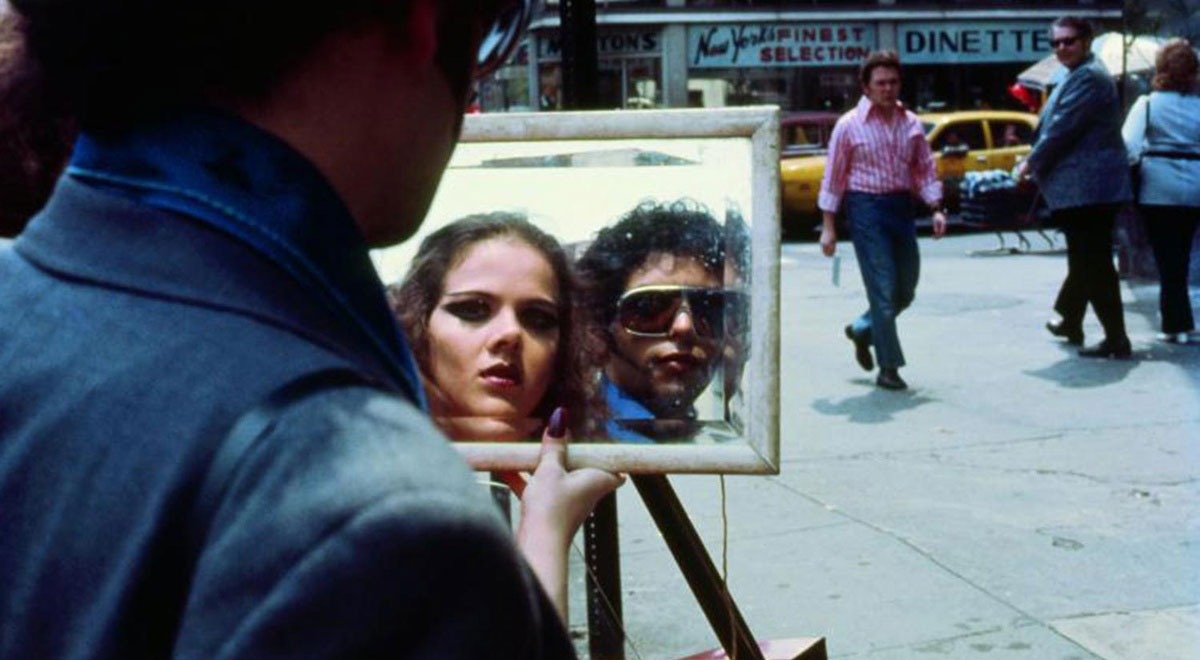
Hélio Oiticica (2012)
César Oiticica Filho
Brazil, 94 min.
Date: Friday 23 March 2018
Time: at 18.00
Place: the Auditorium, floor 2
Langage: Portuguese and English, English subtitles
Price: 65 SEK, 45 SEK for members in Friends of Moderna Museet
Tickets: Buy ticket
The film bar outside the Auditorium is open at 17.30–18.
At 17–17.30 before the film screening on 23 March, the curator Matilda Olof-Ors will give an introductory talk on the exhibition Concrete Matters.
The Moderna Bar will be open after the film screening. Student discount in the bar.
Watch trailer: Hélio Oiticica
On Hélio Oiticica (2012)
César Oiticica Filho
Brasilien, 94 min.
The documentary Hélio Oiticica (2012) carefully exposes the manner through which the artist Hélio Oiticica operated in the prime time of his career. The film is a documentary by his nephew César Oiticica and features a flurry of found footage that documents the socio-political and artistic context of the Brazilian artist in the 1960s and 1970s.
In the film it becomes clear how Oiticica saw himself in relation to the world around him. The result is a portrait of an artist that lived, wanted to engage and most importantly saw humanity as a collective movement capable of change.
Throughout the documentary we become familiarized with Oiticica’s work; from the sculptures and paintings he made in the 1960s to the cinema and slideshow environments in the 1970s. Following the artist through various cultural contexts, from Rio de Janeiro to New York, we can come to understand how his works contains a sense of vibrancy and openness. Hélio Oiticica celebrates the marginal as a source of artistic inspiration. But mostly, it is the soul of the artist that radiates in the discovery of the brilliance of the everyday.
César Oiticica Filho
César Oiticica Filho was born 1968 in Rio de Janeiro. He first trained as a journalist and studied at the New York Film Academy. Since then, he has worked as a painter, photographer, curator, and filmmaker. As director and producer, he is known for Hélio Oiticica (2012) and Neville D’Almeida: Cronista da Beleza e do Caos (2018).
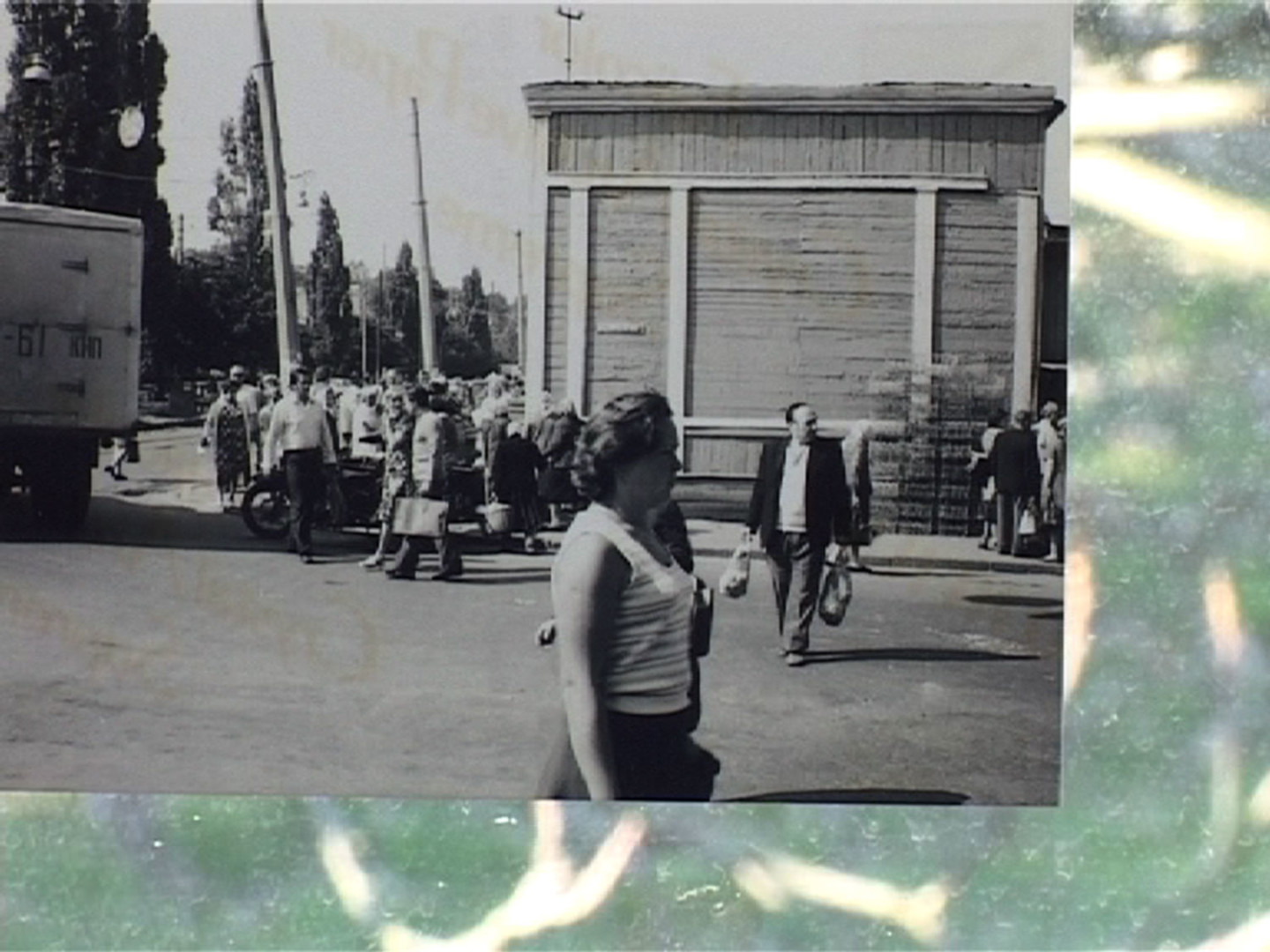
33 Situations (2015)
Anna Daučíková
109 min.
Date: Friday 6 April 2018
Time: at 18.00
Place: the Cinema, floor 2
Language: English
Price: 65 SEK, 45 SEK for members in Friends of Moderna Museet
Tickets: Buy ticket
The screening is followed by a talk with artist Anna Daučíková.
The Moderna Bar will be open after the film screening. Student discount in the bar.
In collaboration with the Royal Institute of Art.
On 33 Situations (2015)
Anna Daučíková
109 min.
The video projection 33 Situations consists of 33 shoots made in the apartments of 33 people who allowed their windows to be used for a display of material evidences of life in the Soviet Union in the 1980s.
This report on individual human situations in the late phase of real socialism resembles a medical record, a secret police dossier or a bullet-point scenario, complemented with would-be-evidence of found footage. It enables us to gaze into the private domain as a stage for the encounter between state power and the individual intimate sphere of everyday life.
By “reporting” on past Soviet life and placing it in contemporary living rooms, Daučíková elaborates on her experience of the end of the totalitarian regime in the USSR, a hallucinatory time of absurdity, and asserts and challenges the truth and fiction of personal and historical memory.
Anna Daučíková
Anna Daučíková is an artist and teacher based in Prague. After her graduation at the Academy of Fine Arts in Bratislava in 1978, she emigrated to Moscow (then USSR), where she lived and worked until 1991. Her extensive painting practice and interest in photography triggered by her encounter with feminist thought relate to this period.
Returning to Bratislava in 1990s, her artistic practice moved towards video art and performance events, then widely organised on the Slovak art scene. In her video art, the involvement of the artist’s body and bodily action became her main concern in presenting her queer statements.
Alongside her artistic work, she was a co-founder and activist in several women’s NGOs and became a spokesperson for LGBT rights in Slovakia. Her academic career includes teaching at the Academy of Fine Arts and Design Bratislava and, since 2012, at the Academy of Fine Arts in Prague.
Since 1991, she has exhibited internationally: 2017, documenta 14, Athens/Kassel; 2016, Gallery Futura, Prague; 2015: Kiyv Biennial/School of Kyiv; 2014: Manifesta 10, Eastern Window, St. Petersburg; 2013: “Good Girls”, MNAC, Bucharest; 2010: “Gender Check – Femininity and Masculinity in the Art of Eastern Europe”, Zacheta National Gallery of Art, Warsaw and in MUMOK, Vienna; “Ars Homo Erotica” at the National Museum in Warsaw; 2009: “Kunst und Öffentlichkeit”, 40 Jahre Neuer Berliner Kunstverein, Berlin.
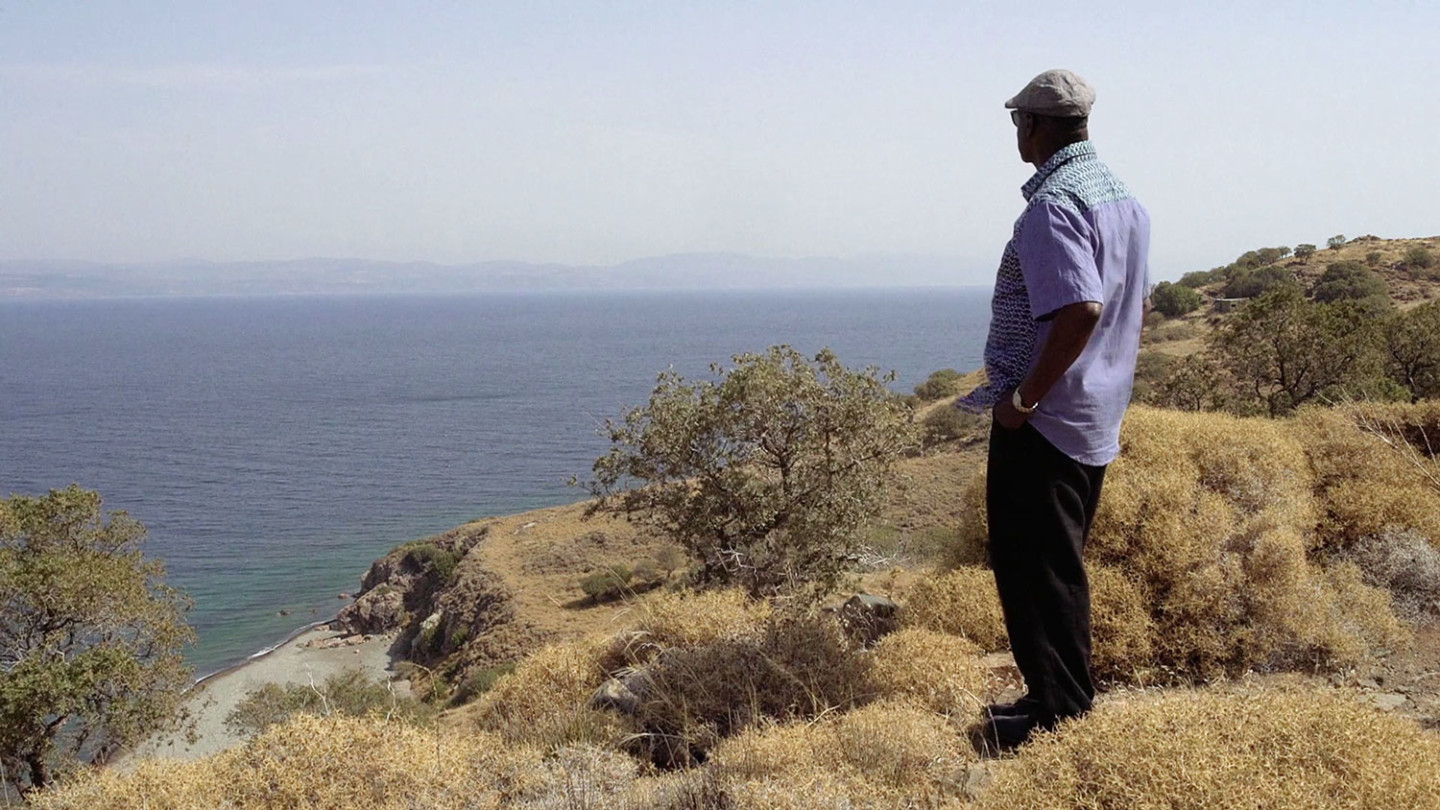
An Opera of the World (2017)
Manthia Diawara
Portugal/USA/Mali, 70 min.
Date: Friday 4 May 2018
Time: at 18.00
Place: the Cinema, floor 2
Language: Bambara and English, English subtitles
Price: 65 SEK, 45 SEK for members in Friends of Moderna Museet
Tickets: Buy ticket
The Moderna Bar will be open after the film screening. Student discount in the bar.
In collaboration with CinemAfrica
On An Opera of the World (2017)
Manthia Diawara
Portugal/USA/Mali, 70 min.
An Opera of the World is an essay film by the Malian writer, filmmaker and cultural theorist Manthia Diawara. It documents the work behind the production in Bamako of Bintou Were, a Sahel Opera. Bintou Were is a young woman and former child soldier, who is pregnant, and several men claim to be the father. She plans to get to Europe and hope that the child will not be born until they are there.
Opera as an art form traditionally deals with events in the distant past – but how can we create works in a time of new experiences for new audiences? In An Opera of the World Diawara gathers critics, opera experts and filmmakers to discuss a meeting between narrative traditions, migration and the writings of the poet Edouard Glissant on who crosses borders and who guards them.
Manthia Diawara
Manthia Diawara (born 1953) holds the title of University Professor at New York University (NYU), where he is Director of the Institute of Afro-American Affairs. He is also Professor in the Department of Cinema Studies at New York University’s Tisch School of the Arts. A native of Mali, Professor Diawara received his education in France and later traveled to the United States for his university studies.
Diawara has taught at the University of California at Santa Barbara and the University of Pennsylvania. He is the author of We Won’t Budge: An African Exile in the World (Basic Civitas Books, 2003), Black-American Cinema: Aesthetics and Spectatorship (ed. Routledge, 1993), African Cinema: Politics and Culture (Indiana University Press, 1992), and In Search of Africa (Harvard University Press, 1998). He has published widely on the topic of film and literature of the Black Diaspora. Professor Diawara also collaborated with Ngûgî wa Thiong’o in making the documentary Sembene Ousmane: The Making of the African Cinema (2015).
The Film Club
Film has had a prominent position at the Museum since the start. The Moderna Museet Film Club has existed since the Museum opened in 1958, showing everything from children’s matinees to the latest experimental art films. In 2018, the Film Club will present films on the boundary between art and documentary. Often, the artist or director will take part in discussions after the screenings.
The Film Club editorial team: Lena Essling, curator, Catrin Lundqvist, curator, Jo Widoff, curator.
Contact: filmklubben@modernamuseet.se
The spring programme was compiled in collaboration with CinemAfrica, the Royal Institute of Art and the Stockholm Feminist Film Festival.

